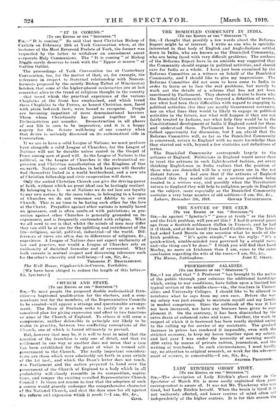"Tr is COMING."
ITo THE EDITOR or THE " SPECrATOZ."1
ffia,—" It is coining." So said that most Christian Bishop of Carlisle on February 13th at York Convocation when, at the instance of the Most Reverend Prelate of York, the former was requested by the latter to withdraw an amendment anent corporate Holy Communions. The "It is coming" of Bishop Diggle surely deserves to rank with the " Eppur si muove " of Galileo tialilet The proceedings of York Convocation (as at Canterbury Convocation, too, for the matter of that, as, for example, the reference in respect to fraternal relationship with Noncon- formists proposed by the saintly Bishop Talbot of Winchester) betoken that some of the higher-placed ecclesiastics are at last somewhat alive to the trend of religious thought in the country —that trend which the practical experience of the various Chaplains at the front has emphasized, and which trend these Chaplains to the Forces, as honest Christian men, faced with plain bed-rock facts, were bound to recognize. People are becoming impatient of mere denominational barriers Those whom Christianity has joined together let no Ecclesiasticism put asunder. Reconstruction in all phases of our life is seen to be imperative, and it is a happy augury for the fnture well-being of our country when that desire is seriously discussed on its ecclesiastical side in Convocation.
If we are to have a solid League of Nations, we must perforce Lave alongside a solid League of Churches, for the League of Nations will not be durable unless rooted in the Gospel of Peace among men of good will. As the League of Nations is the political, FO the Isague of Churches is the ecclesiastical ex- pression and Christian manifestation of the Kingdom of God en earth. Nations and Churches in both Leagues will thereby find themselves linked in a world brotherhood, and a new era of Christian fellowship and civic co-operation will dawn.
Only the united Christian Church can give the driving-power of faith, without whirls no great ideal can be lastingly realized By belonging to a ue of Nations we do not lose our loyalty to our own nation; by the seine token, in belonging to a League of Churches we do not renounce our fidelity to our own Church. This is no lime to be hating each other for the love of the Christ. Prejudice against other nations is usually based en ignorance, and is often confused with patriotism; so pre- notion against other Churches is generally grounded on in- cognizance, and is frequently confounded with religion. What we all need to see is that whilst the minds of men may differ they can still be at one for the uplifting and enrichment of the life—religious, social, political, industrial—of the world. Dif- ferences of views are often due to differences of religious, Ac., experience. A League of Nations does not expect uniformity of law and practice, nor would a League of Churches rely on todformity of doctrinal formulas and of ceremonial. What both connote is mutual respect and discerning tolerance each for the other's sincerity and well-being.—I am, Sir, Ac.,
THEODORE I'. BROCELEHORST.
The Well House, f:iggleswick-in-Craren, Yorkshire.
[We have been obliged to reduce the length of this letter.— Ea. Spectator.]






































 Previous page
Previous page